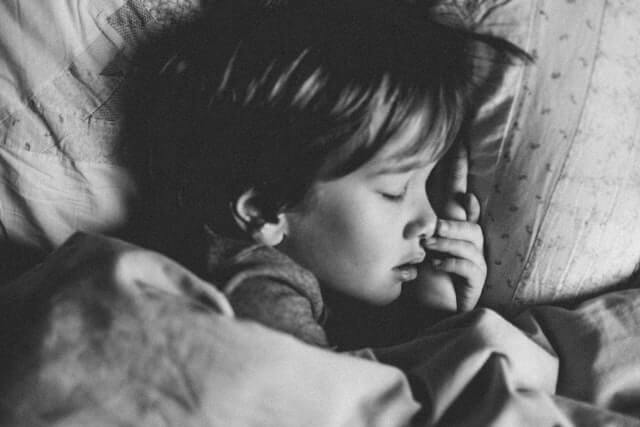
Many parents or caregivers of children with autism notice that their child struggles with sleep. This can be for a variety of reasons; one of the common conclusions is that children with autism suffer from sleep disorders. This article will explore that idea, giving possible causes and solutions.
Are Sleep Disorders Common with Autism?
It is estimated that anywhere between 50-80% of children with disorders on the autism spectrum struggle with some form of sleep disorder. This can range from difficulty falling asleep, restlessness or waking often/early, or insomnia to general poor sleep quality. Inconsistent sleep routines can exacerbate these struggles, but since the anxiety around sleep can also cause behavioral issues, it can be hard for caregivers to stick with solid sleep routines, making the cycle even worse.
There are many possible causes for this range of sleep disorders, which we will now discuss.
What Causes Sleep Disorders in Children with Autism?
In general, children use social cues to know when it is bedtime—seeing that their family members are slowing down and beginning to ease into a time of relaxing and quiet—but children with autism don't easily pick up on social cues, often not at all. This can make it more difficult for the body and mind of a child with autism to recognize and feel comfortable with easing into bedtime.
Children with autism also might have increased sensitivity to outside stimuli. Meaning that neurotypical people can have lights on, watch TV, eat a sugary dessert, or play an enthusiastic board game right before bed and go to sleep just fine, but a child who is more sensitive to these stimuli will have an incredibly hard time winding down afterward and not be able to sleep.
Melatonin is also an important component of the sleep cycle, not only in children with autism but in all people. To make melatonin, the body needs an amino acid called tryptophan (which is in turkey, remember how people always say turkey makes you sleepy at Thanksgiving?); research has found that melatonin levels are either much higher or much lower in children with autism.
As you can imagine (or have already experienced), this range of sleep disorders or problems can have frustrating effects on the life of a child with autism and their family dynamic.
What Kind of Effects Do Sleep Problems Have?
Children with autism already struggle with things that come naturally to neurotypical children, such as sensory regulation, language skills, learning and cognitive skills, body balance, and more. In anyone, and especially in a child with autism, not having proper sleep can make all of these struggles even more intense and frustrating.
Research has shown that there is a connection between lack of sleep and the following characteristics in children with autism:
- Aggression
- Depression
- Hyperactivity
- Increased behavioral problems
- Irritability
- Poor learning and cognitive performance
Sleep disorders in children with autism are a hurdle for any caregiver, but there are many solutions that can help ease this part of life with a child with autism.
How Can I Help My Child Sleep Better?
There are plenty of things a parent or caregiver can do to help their autistic child sleep better. First, avoid stimulating food or activities within an hour of beginning the nighttime routine, such as caffeine and sugar. They make the nighttime process much more difficult as autistic children are more sensitive to outside stimuli.
Next, establish a routine each night for the evening and going to bed. Make sure to begin this at the same time every night to help their body remember that it is time for sleep. You can help your child relax before bed by moving to a relaxing part of their room, giving a gentle back massage, or turning on soft music.
To prevent sensory distractions during the night, put heavy curtains on your child's windows to block out the light, install thick carpeting, and make sure the door doesn't creak. You can also make sure that the temperature of the room and choice of bedding fit your child's sensory needs. If they are comforted by it, a sound machine could help them zone into their space and prevent distractions from the rest of the house.
Sleeping Medication for Children with Autism
Many doctors or medical professionals recommend trying a sleeping medication for children with autism. There are many choices, each with its own benefits and potential side effects, so make sure to talk with your child's provider and make a plan for their individual needs.
Some options are:
- Antihistamines - usually for allergies, can help induce drowsiness
- Motrin - an anti-inflammatory that can help calm the body
- Melatonin - a form of what the body naturally produces to induce sleep
- Clonidine - treats hypertension and ADHD but has sedative-like side effects
- Benzodiazepines - mostly given to adults
- Z drugs - many side effects reported
- Antidepressants - may have sedative-like effects
Some children may experience a range of side effects from their doctor's choice of medication, and others may not. Many children with autism are also on other medications, so the possibility of those drugs not working well together needs to be explored as well.
Final Thoughts
As with any parent who has a child struggling with something in life, you want to help your little one be comfortable, healthy, and successful. Sleep is important for all of us and especially so for children with autism. There are many things you can add to your daily and nighttime routine and many that you can remove to help your child sleep better.





